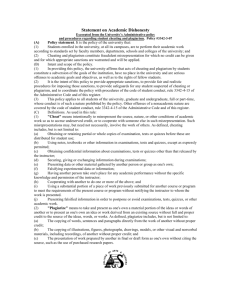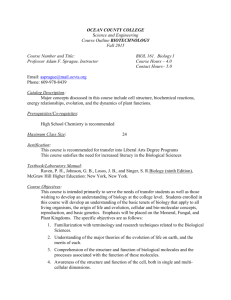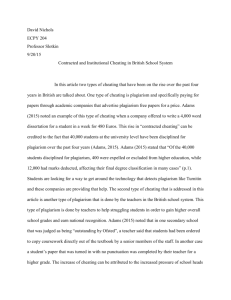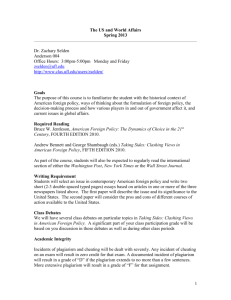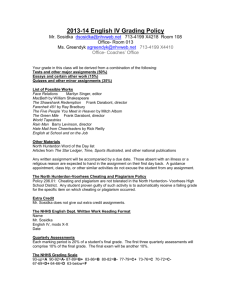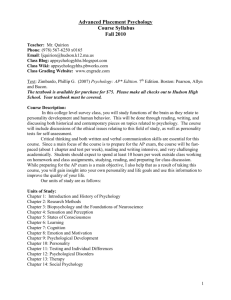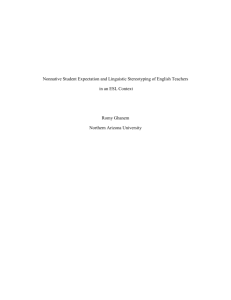Teaching International Students: Some Tips
advertisement
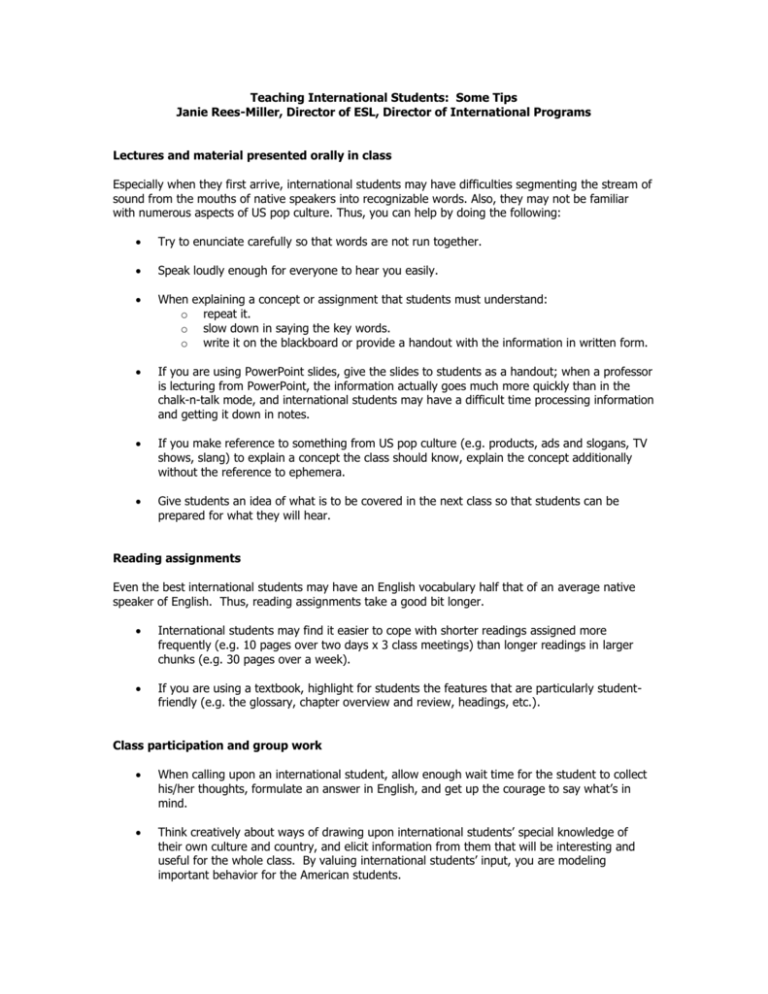
Teaching International Students: Some Tips Janie Rees-Miller, Director of ESL, Director of International Programs Lectures and material presented orally in class Especially when they first arrive, international students may have difficulties segmenting the stream of sound from the mouths of native speakers into recognizable words. Also, they may not be familiar with numerous aspects of US pop culture. Thus, you can help by doing the following: Try to enunciate carefully so that words are not run together. Speak loudly enough for everyone to hear you easily. When explaining a concept or assignment that students must understand: o repeat it. o slow down in saying the key words. o write it on the blackboard or provide a handout with the information in written form. If you are using PowerPoint slides, give the slides to students as a handout; when a professor is lecturing from PowerPoint, the information actually goes much more quickly than in the chalk-n-talk mode, and international students may have a difficult time processing information and getting it down in notes. If you make reference to something from US pop culture (e.g. products, ads and slogans, TV shows, slang) to explain a concept the class should know, explain the concept additionally without the reference to ephemera. Give students an idea of what is to be covered in the next class so that students can be prepared for what they will hear. Reading assignments Even the best international students may have an English vocabulary half that of an average native speaker of English. Thus, reading assignments take a good bit longer. International students may find it easier to cope with shorter readings assigned more frequently (e.g. 10 pages over two days x 3 class meetings) than longer readings in larger chunks (e.g. 30 pages over a week). If you are using a textbook, highlight for students the features that are particularly studentfriendly (e.g. the glossary, chapter overview and review, headings, etc.). Class participation and group work When calling upon an international student, allow enough wait time for the student to collect his/her thoughts, formulate an answer in English, and get up the courage to say what’s in mind. Think creatively about ways of drawing upon international students’ special knowledge of their own culture and country, and elicit information from them that will be interesting and useful for the whole class. By valuing international students’ input, you are modeling important behavior for the American students. Depending on their culture and level of English, many international students will not generally be as vocal as some US students. Asking questions in class or volunteering comments may be viewed in their home culture as rude and disrespectful to the teacher. For these students, you may just have to accept that their level of participation will not be the same as that of US students. International students will often be more comfortable participating in small group work than in front of the whole class. Some suggestions: o It is worthwhile reviewing with the whole class ways to make group work productive, such as including everyone in discussions, checking for understanding within the group, eliciting the opinions of those who have not spoken up, etc. o If all international students are put in one group, they may feel marginalized and alienated from their American classmates. Testing In making up an exam, keep the following in mind: o Whenever it will not compromise academic content, simpler vocabulary is preferable. For example, movement is a more common word than locomotion. o Wherever possible, use simpler sentence structure in place of more complex structure. o In directions and elsewhere, telegraphic writing is hard for nonnative speakers to understand. For example items on right used only once could leave the nonnative speaker wondering, “What did the items on the right use only once???” o Typographical errors or misspellings cause undue trouble for nonnative speakers. They will assume that the typo or misspelled word is a legitimate English word and will spend inordinate time trying to figure it out. International students will probably read more slowly and write more slowly than US students because they are processing the information in a second language. Depending on the subject matter that you are testing and your own beliefs about fair testing, you may wish to: o Allow extra time for reading the test questions and/or writing the answers. o Allow international students to ask you the meanings of words that are not explicitly being tested. Some professors allow international students to use dictionaries or electronic translators during exams, but whether this is appropriate for your exam will depend on the nature of the exam: o If spelling and vocabulary are not being explicitly tested, allow international students to use dictionaries (you can supply the dictionaries if you have them). o Most international students have electronic translators; depending on the program, some are reasonable dictionary substitutes, while others are not terribly useful. Be aware, though, that electronic translators can be programmed with other information. Cheating and plagiarism In many cultures, helping a friend may be of higher value than avoiding cheating; also, different cultures have very different ideas about appropriate citation and documentation of source material. In addition, international students usually work very hard and are pressured by their parents to get good grades. Thus, what we would call cheating and plagiarism may occur when the international student has no real intention of being dishonest. To avoid the heartbreak and hassle of dealing with cheating on an exam: o Do not ask questions that can be answered with memorized chunks from the textbook. o Do not seat international students who are good friends together during an exam. o Do not put international students together in a separate room unsupervised for an exam. Because of the importance of helping one’s friends in some cultures, many international students study together and may share homework. Be very explicit about how much help they are allowed to give each other and what is acceptable and unacceptable. In some cultures, the good student is expected to cull “beautiful sentences” from the work of others and incorporate them without quotation or citation. To help students understand what is appropriate and inappropriate in US academic culture: o Give explicit instruction and modeling of what is acceptable and unacceptable. o Explain explicitly how bad “unacceptable” is, and make sure that students know where to go for help if they are not sure whether to document or cite. If you suspect cheating or plagiarism from an international student—especially a new student—do not automatically assume an intent to be dishonest. Often, if you call the student (or students) into your office and ask about the process they went through in completing an assignment or doing an exam, they will honestly tell you (e.g. they collaborated or went online and found some “beautiful sentences”). That is a teachable moment when you can explain that the practice is unacceptable in this culture. It is then up to you what penalties to impose, but a first offense committed out of ignorance of cultural conventions might be treated somewhat more leniently than cheating or plagiarism with dishonest intent. Campus resources If you have any questions, problems, or conundrums with respect to international students, do not hesitate to call or email Janie Rees-Miller in the International Office (x4486; reesmilj@marietta.edu). The campus Writing Center is also a great source of help and is quite experienced in tutoring international students. Call or email Tim Catalano (x4636; catalant@marietta.edu). Finally: Each new international student is tested for English-language proficiency on arrival and placed in an appropriate English as a Second Language class if necessary. Although most students who take ESL make considerable progress in the ESL course(s), they will not be native speakers of English after a semester or year of ESL. However, given some ability and a good deal of effort, they can become competent users of a second language during their time at Marietta College. The majority of international students at Marietta College are very bright and extremely hard-working, and the rewards of having them in your classes more than compensate for any adjustments necessary to help them achieve their potential in a second language and different culture.


